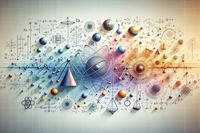How Quantum Theory Relates to Consciousness
Experimental physicist Rob Sheldon explains the background to Hameroff and Penrose’s contested quantum consciousness theory, which is beginning to be tested

Understanding the Connection between Quantum Theory and Consciousness
The theory of quantum mechanics (QM) has been linked to consciousness through the work of physicist Roger Penrose. In his book, The Emperor's New Mind, Penrose argues that human consciousness cannot be modeled by a conventional Turing machine, as it is non-algorithmic and non-deterministic. He proposes that quantum mechanics plays a crucial role in understanding consciousness, with the collapse of the quantum wavefunction being significant in brain function.
Penrose's goal is to demonstrate that the mind is more than just the brain without resorting to dualism. To achieve this, he relies on quantum mechanics as a material and non-deterministic framework that gives consciousness greater power than computers.
However, Penrose faces a challenge in reconciling the microscopic nature of quantum mechanics with the macroscopic nature of the human brain. He suggests that the elongated wavefunctions of microtubules in neurons might hold the key. When these microtubules overlap, their wavefunctions also overlap, creating a single entangled wavefunction that stretches throughout the brain. This non-local and distributed wavefunction can respond to external inputs, leading to discrete effects despite analog inputs.
Exploring the Potential of Penrose's Quantum Consciousness
It remains to be seen whether Penrose's quantum consciousness theory is correct. However, it offers an alternative to the materialistic view of the mind as nothing more than a collection of neurons. By incorporating quantum mechanics, Penrose opens up new possibilities for understanding the nature of consciousness.
Unlike the Universal Turing Machine model of the brain, Penrose's theory avoids the limitations of non-computable problems. It proposes that consciousness arises from the collapse of the wavefunction, allowing for discrete digital effects in response to distributed analog inputs.
While the full implications of quantum consciousness are uncertain, it challenges the prevailing materialistic paradigm and introduces a range of potential explanations for the mysteries of human consciousness.
Looking Ahead: The Future of Quantum Theory and Consciousness
The connection between quantum theory and consciousness continues to be an area of active research and exploration. As scientists delve deeper into the mysteries of quantum mechanics and the nature of consciousness, more options and possibilities emerge.
It is unclear how a quantum theory of consciousness will ultimately unfold, but one prediction can be made: it is unlikely to strengthen the cause of materialism. This ongoing exploration of the quantum-mind connection has the potential to revolutionize our understanding of consciousness and shape new perspectives on the fundamental nature of reality.
For now, we await further developments and discoveries in this fascinating field, hoping to gain deeper insights into the intricacies of our own consciousness and the universe we inhabit.



